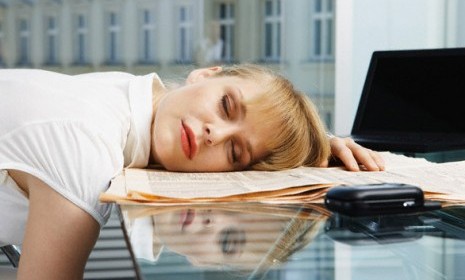Going to work sleepy: As bad as showing up drunk?
In America's culture of "sleep machismo," we're working more, but sleeping less — and new research shows drowsiness is as risky as drunkenness

A free daily email with the biggest news stories of the day – and the best features from TheWeek.com
You are now subscribed
Your newsletter sign-up was successful
Many companies encourage workers to put in long hours or even pull all-nighters — but they might as well promote showing up to work inebriated, according to sleep researchers. "We would never say, 'This person is a great worker! He's drunk all the time!'" says Harvard sleep expert Charles Czeisler, who's found that 24 hours without sleep or a week of 5-hour sleep nights is equivalent to a blood alcohol level of 0.1 percent. Here's a brief guide to the costs of sleep deprivation:
Why is it bad to work without sleep?
Sleepy employees get sick more often, make more mistakes, and are less productive — for practical purposes, they equivalent to drunks. Not surprisingly, the results are often deadly: Many big industrial disasters — Exxon Valdez, Three Mile Island, Chernobyl — can be traced to mistakes by sleep-deprived workers; one in 20 first-year medical residents make fatal fatigue-related errors, and about one fifth of serious car accidents involve driver sleepiness.
The Week
Escape your echo chamber. Get the facts behind the news, plus analysis from multiple perspectives.

Sign up for The Week's Free Newsletters
From our morning news briefing to a weekly Good News Newsletter, get the best of The Week delivered directly to your inbox.
From our morning news briefing to a weekly Good News Newsletter, get the best of The Week delivered directly to your inbox.
Is there a quantifiable cost?
One recent study of four U.S. companies found that sleep deprivation cost them $1,967 per employee per year in lost productivity — a figure that rises to $3,556 for employees with frequent insomnia.
Who's most likely to be sleep-deprived?
Corporate executives, according to one new study. Lawyers are also disproportionately sleepy, as are long-haul truckers, doctors, and pilots.
A free daily email with the biggest news stories of the day – and the best features from TheWeek.com
Why are we working more and sleeping less?
Part of it is "sleep machismo," says Czeisler, which "glorifies sleeplessness in the way we once glorified people who could hold their liquor." There's also a drive to be more productive, which sleep researchers say is actually defeated by giving up sleep for work. And increasingly, we just can't sleep — Canadian and U.S. surveys show that between 10 percent and 50 percent of workers report insomnia.
Other than getting a better night's sleep, what can workers do?
Some high-end spas are offering "sleep retreats," but the best solution might be to take 20- to 45-minute midday naps. Some companies, including Nike and Pizza Hut, have created nap breaks and nap rooms, and one entrepreneur started a chain of MetroNaps "nap centers." Japanese workers take catnaps, often at their desks, and Spain is trying to reintroduce the siesta.
How much does a nap really help?
A study for NASA found that a quick nap can boost worker output by 34 percent. "Which person do you want on the job?" asks Mark Rosekind, who conducted the study. "The one with 34 percent better performance and 100 percent more alert — or the other guy?"
Sources: National Geographic, Lifehacker, Canadian Business
-
 The ‘ravenous’ demand for Cornish minerals
The ‘ravenous’ demand for Cornish mineralsUnder the Radar Growing need for critical minerals to power tech has intensified ‘appetite’ for lithium, which could be a ‘huge boon’ for local economy
-
 Why are election experts taking Trump’s midterm threats seriously?
Why are election experts taking Trump’s midterm threats seriously?IN THE SPOTLIGHT As the president muses about polling place deployments and a centralized electoral system aimed at one-party control, lawmakers are taking this administration at its word
-
 ‘Restaurateurs have become millionaires’
‘Restaurateurs have become millionaires’Instant Opinion Opinion, comment and editorials of the day